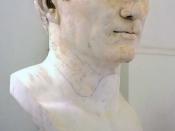Blood Imagery in Julius Caesar
"Thematic patterns of fire and blood, with their vivid imagery, are among the most immediately noticeable in the play." (McMurty, 67) In Julius Caesar, the image of blood introduces the idea of violence into the readers mind. The fluidly creates a sinister mood, contributes to characterization, foreshadows, and reinforces the theme of politics. This sinister mood is almost always means of foreshadowing. Blood appears in two forms in the play. Blood in the body, and blood outside of the body. When blood is out of its normal confine, it symbolizes political disturbance.
Blood as seen inside the body, or controlled blood, appears in a seemingly peaceful, practical aspect. Blood is not always used to convey violence. It may keep to its proper place and traverse through ones veins. Brutus is one to speak of blood in this tense. Brutus speaks:
"every drop of blood
That every Roman bears, and nobly bears,
Is guilty of a several bastardy" (II.i.136-138)
Similarly, Brutus while confirming his own love for Portia, dreams of his own blood coursing in an orderly, yet gloomy matter, flowing through his veins.
"You are my true and honorable wife,
As dear to me as are the ruddy drops
That visit my sad heart." (288-290)
Before Caesar is murdered, he uses blood in an ordinary sense of safe circulation.
While being begged by the conspirators to repeal the banishment of Metellus Cimber's brother, Caesar speaks:
"I must prevent the, Cimber.
These couchings and these lowly courtesies
Might fire and the blood of ordinary men...
...Be not fond
To think Caesar bears such rebel blood." (III.i.35-40)
In all of these above quotations, blood is used for means of characterization. Shakespeare has Brutus speak of the citizens of Rome while trying to convince the conspirators...


